Analyzing the deposition of FBI Agent Francis Chan
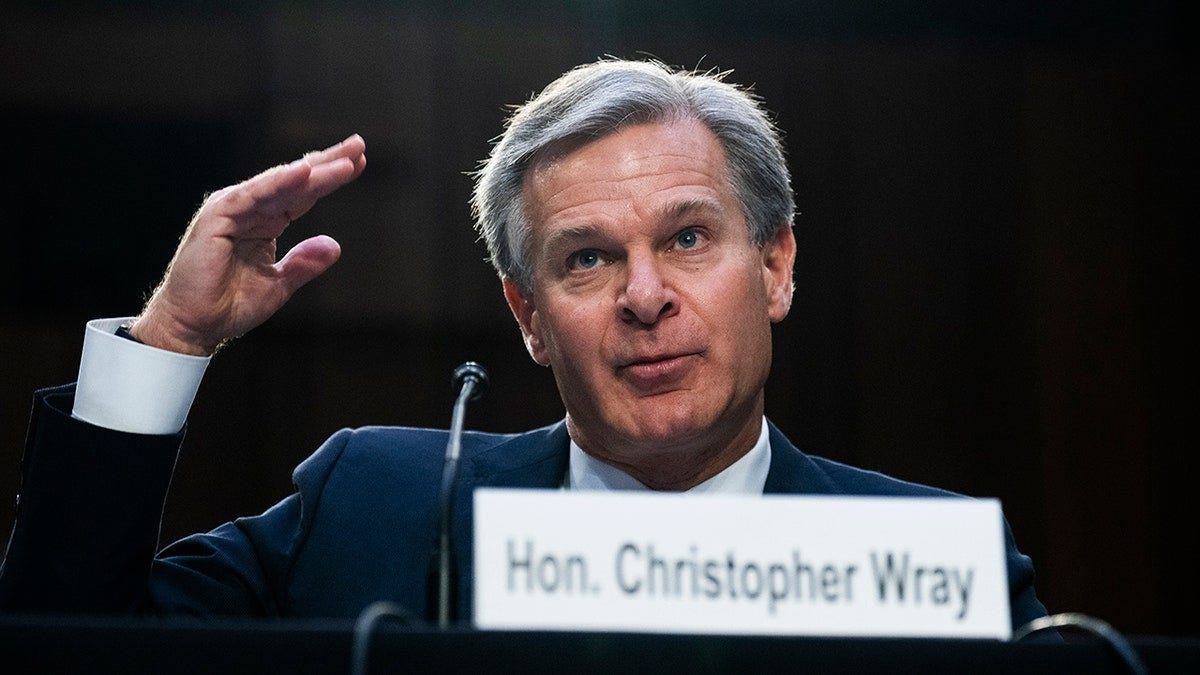
Today, we learned more about the FBI’s influence operation during the 2020 election election. Yesterday, as part of a civil rights suit against the Biden Administration, Missouri Attorney General (and Senator-elect) Eric Schmitt released the deposition transcript of Dr. Anthony Fauci.
And just now, he just posted the transcript of FBI Supervisory Special Agent Elvis Chan. Read it here.
The importance of SSA Chan shouldn’t be understated. He was at the front-lines of the FBI’s efforts to curb speech on social media during the 2020 election. It was Chan who has been reported to have had “weekly meetings with major social media companies to warn against Russian disinformation attempts ahead of the 2020 election.”
Chan’s testimony provides insight into these efforts. Here are the highlights.
Chan and the 2016 DNC “Hack”
For starters, just so you get an idea of who you’re dealing with, Chan is a firm believer in the still-unproven theory that Russia hacked the DNC/DCCC and then leaked those materials “over the course of the 2016 election.” It gets better: Chan was the supervisor of a squad that helped investigate the 2016 DNC hack.

One can’t help but ask whether Chan, a “supervisor”, could have obtained the DNC server. Or if he even though to request it. As observed by our friend Stephen McIntyre, Chan was in contact with DNC/Hillary campaign lawyer Michael Sussmann about that hack.
In fact, Chan believes Russia could have influenced the 2016 presidential election:
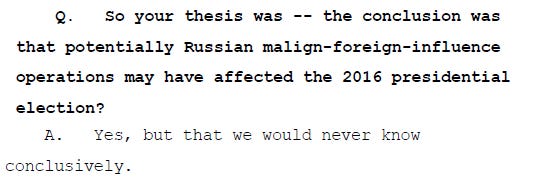
The 2020 Election – Security Meetings between the US Government and Social Media Companies.
Leading up to the 2020 election, Chan was present during meetings between social media and tech companies, such as Facebook, Microsoft, Google, Twitter, Yahoo, and Reddit, and the U.S. Government, which was represented by CISA (Cybersecurity and Infrastructure Security Agency), Office of the Director of National Intelligence (ODNI), Department of Homeland Security, and the FBI.
The FBI and other agencies would provide the social media/tech companies with “strategic information” regarding foreign – and specifically Russian – “influence campaigns.” One example of this information sharing had to do with the Russian company “Internet Research Agency” (a troll farm that was indicted by Mueller before those charges were ultimately dismissed by Barr), which had moved their operations to Ghana and Nigeria. Chan and the FBI believe the Internet Research Agency “is trying to make inroads in western Africa.” A warning to the West: your memes are from Russians in Western Africa.
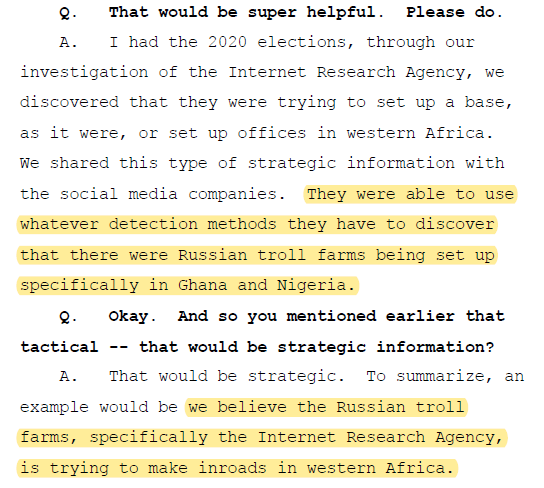
Chan testified that once the social media companies get this information they take down the accounts. The FBI doesn’t “control” what the companies do; they just provide “information” so the social media companies can take whatever steps they deem appropriate. One of those appropriate steps – one of those ways to “protect their platforms” – is to take down those accounts. In fact, Chan concluded in his thesis that the US government essentially assisted with “account takedowns.” It was a joint effort.
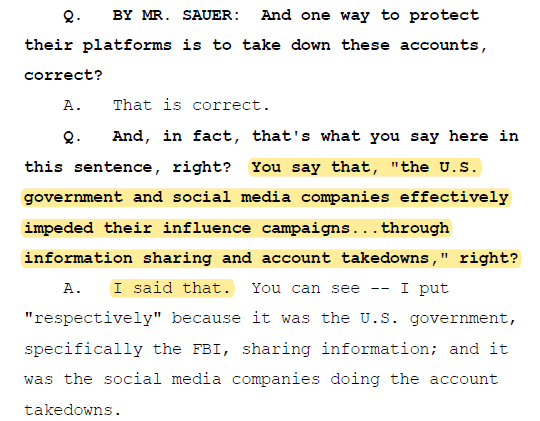
In other words, the social media companies don’t need directions from the US government to remove content because there’s an understanding between the parties. This would include content that the US government deemed to be foreign (Russian) “social media influence campaigns” that focus on current events or “amplify existing content.” This is all for the Russian government’s purpose to “sow discord”:
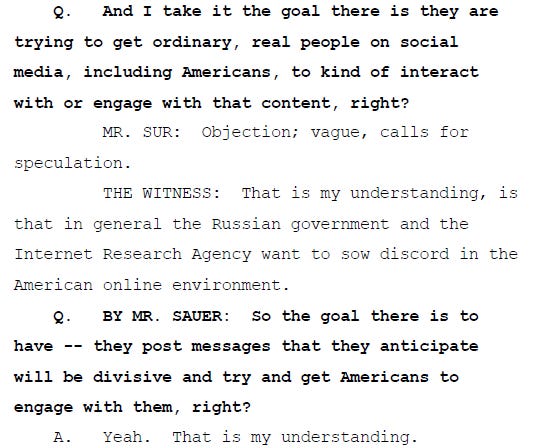
Chan also explained how the FBI would share the “disinformation” or “misinformation” with social media companies. It would take place around the time of quarterly meetings, if not more frequently through secure e-mails if the FBI field offices thought necessary. For example, the FBI might notify Facebook that a certain IP address is associated with the Internet Research Agency. The accounts flagged by the FBI are always removed by the social media companies, in large part because of pressure from Congressional Committees. As explained by Chan:
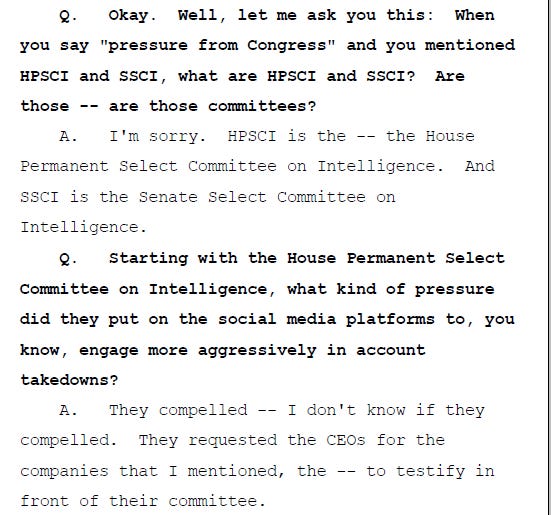
Around this same time, there were visits from Congressional staffers to pressure social media companies. Senior-level staffers have even visited Facebook, Google, and Twitter as part of these influence – or censorship – campaigns.
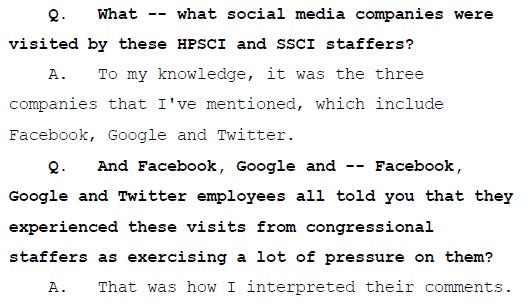
Chan continued:
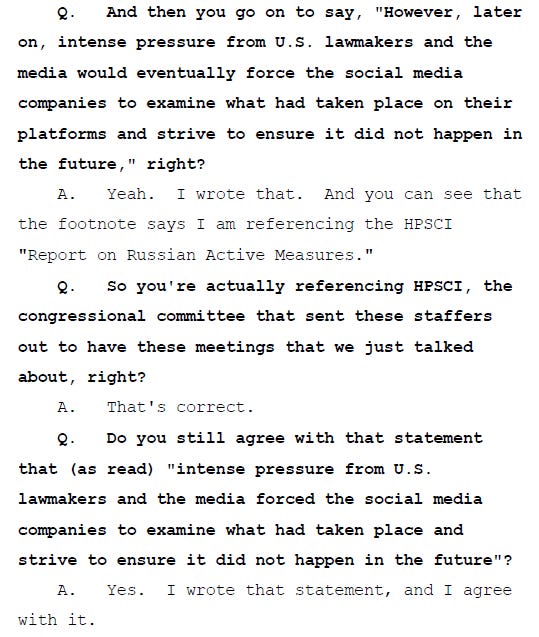
Information about the 2020 Election and the suppression of American content.
During the 2020 election, the FBI’s San Francisco field office had an election “command post,” which flagged “disinformation” regarding “the time, place or manner of elections in various states.” The flagged content would be referred to the applicable social media platform where it was posted. It didn’t matter whether the content was from Americans or from a foreign actor. Chan explained that the FBI was conducting these actions upon instructions from the DOJ, which had informed them “that this type of information was criminal in nature.”
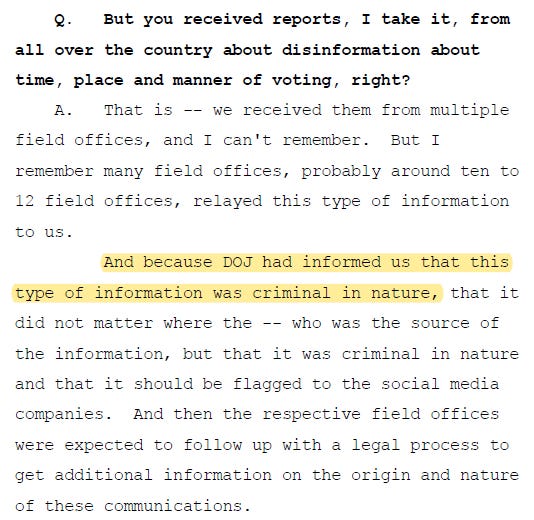
The social media companies sometimes disagreed. In fact, half the time the social media companies wouldn’t remove the content. Chan estimated a 50% success rate.
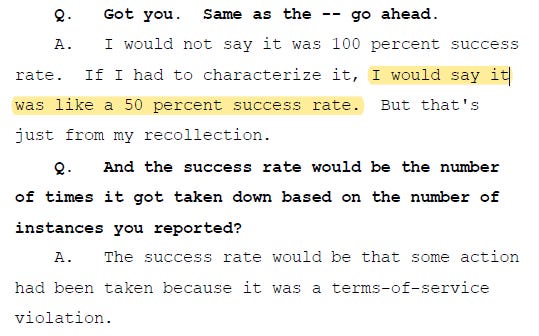
The Purported 2020 Russian “hack and leak” operation.
There’s a lot to cover here, and hopefully I provided enough background to get to the juicier stuff. Or at least the content that applies, in some ways, to the more concerning suppression of information during the 2020 election and after, such as the Hunter Biden laptop and COVID-19 information.
Here’s Chan discussing FBI warnings about a “2016-style DNC hack-and-dump operation” and gave instructions to “stay vigilant” about similar operations that may take place “before the [2020] election”:
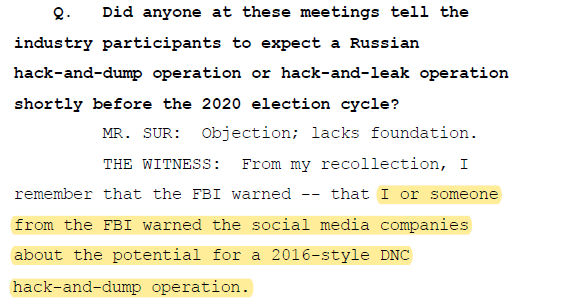
Chan didn’t warn the companies based on actionable intelligence. Instead, the FBI gave this warning multiple times out of “an abundance of caution” and based on what allegedly transpired in 2016 with the DNC/DCCC hack.
At around that time, Chan wasn’t aware that the FBI had in its possession the Hunter Biden laptop. He only became aware when this information was published by news outlets. Hunter Biden, according to Chan, was never mentioned in the FBI meetings with the social media companies. Facebook, however, asked about the Hunter Biden information. The FBI’s response? “No comment.” Chan explains
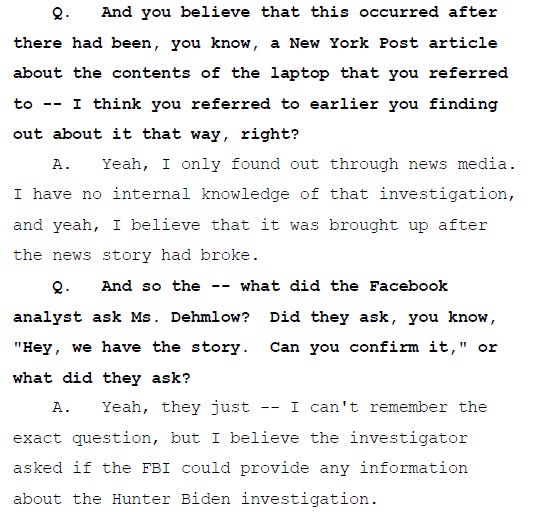
Chan was presented with a declaration from Yoel Roth, the then-Twitter Head of Trust and Safety, in which Roth stated he was informed by people in the intelligence community to “expect” attacks on individuals linked to political campaigns. Chan’s recollection differed, stating that there was only the potential for such attacks.
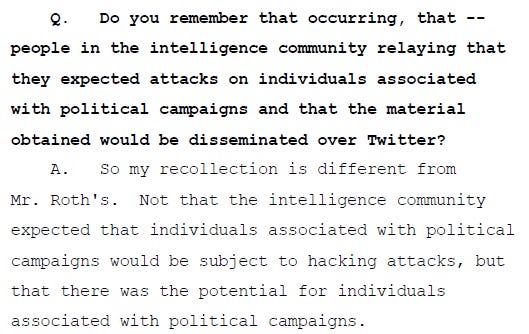
Roth also stated in his sworn declaration there were rumors “that a hack-and-leak operation would involve Hunter Biden.” Chan couldn’t recall Hunter Biden ever being mentioned in those meetings.
Q: How would you interpret what he said when he says he learned that there were rumors that a hack-and-leak operation would involve Hunter Biden? What do you think he’s referring to?
A: Yeah, in my estimation, we never discussed Hunter Biden specifically with Twitter.
Chan also claimed ignorance to Roth’s contention that Twitter’s belief the Hunter Biden materials could have been hacked was based on “the information security community’s initial reactions.” Chan wasn’t sure if this included the FBI, or if Twitter reached out to the FBI about the Hunter Biden information.
But – if the material were “hacked” – the social media companies were put on notice that they needed policies to address that situation. A harmless question? More of a hint to get social media companies to agree to remove the content. Especially because the FBI had plans to ask the social media companies themselves to remove hacked content.
I hope it’s clear what happened. There’s not a smoking gun – there’s no direct e-mail from Chan or from the FBI to Twitter of Facebook, from what we’ve seen, to remove the Hunter Biden story. That’s by design: there didn’t need to be. The instructions from the US government about “hack and leak” operations were quite clear, and the agency did nothing to dissuade social media companies from “believing” the Hunter Biden materials where hacked. The beauty of this plan, if you can call it that, was that the FBI and Twitter (and Facebook) all gave themselves cover by pointing the finger to the other.
In a close election, that’s what we call tipping the scales.
In related news… Twitter General Counsel James Baker has been “exited.” The story is still developing, but part of the reason appears to be because he was “vetting” the Twitter Files which show FBI/Twitter communications and which inform the decision to ban the Hunter Biden story. More to come as that story develops…
Source – https://technofog.substack.com/p/fbi-agent-testimony-warnings-of-a
